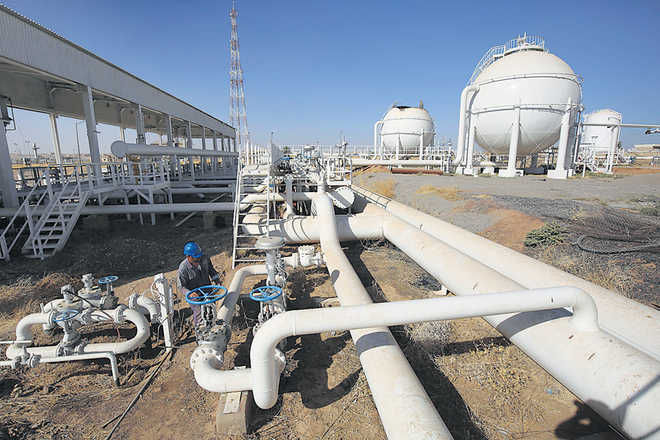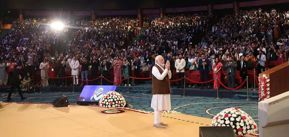
Topping up: Iraq is now our largest supplier of oil, overtaking Iran and Saudi Arabia.
G Parthasarathy
As sectarian Shia-Sunni and civilisational Arab-Persian-Israeli rivalries dominate the geopolitics of our western neighbourhood today, India faces a very different situation from what it confronted four decades ago, when the 1973 Arab-Israeli conflict flared up. The Organisation of Arab Petroleum Oil Exporting Countries (OAPEC), led by Saudi Arabia, announced an oil boycott of countries like Canada, Japan, the Netherlands, the US and the UK, considered to be pro-Israeli. They found themselves squeezed by an Arab embargo on oil supplies. A cash-strapped India found itself in a desperate economic situation, as oil prices rose rapidly from $3 to $43 per barrel. Saudi Arabia demanded that New Delhi should close the Israeli Consulate in Mumbai, or face an Arab oil boycott. An enraged Prime Minister Indira Gandhi refused to comply. India emerged relatively unscathed, thanks to developments like oil supplies from the Soviet Union, the discovery of Bombay High oil and gas and “assistance” by the Shah of Iran, who enjoyed a cosy relationship with Israel.
Four decades later, the global energy and geopolitical scenario stands drastically changed. With the discovery of shale oil/gas in the US and Canada and huge oil reserves in Venezuela, untapped shale gas reserves in Argentina, and with Mexico adding to world oil supplies, North America and parts of Europe are relatively immune to blackmail. This is more so as Russian oil and gas contribute to meeting energy demands in Europe and across Eurasia. Saudi Arabia is now forced to seek Russian cooperation in regulating world energy supplies. Oil prices once at $130 a barrel slumped to $30 and now hover around $60-70 per barrel. The major markets for oil supplies from the Arab/Persian Gulf countries are China (8.4 million barrels per day, bpd), India (4.4 million bpd) and Japan (3.4 million bpd). In the meantime, the oil producing Gulf monarchies, who are major suppliers of oil, are today preoccupied in dealing with a resurgent Iran, which is presently free from Western-led international sanctions. Iran is evidently seeking to become the dominant power in the energy-rich Gulf region.
The strategic scenario in our oil-rich West is now very different from what it was earlier. The advent of the Islamic Republic in Iran has led to a drastic downturn in Iran’s relations with Israel. Tel Aviv has fomented the hostility to Iran across the world. Iran, in turn, has behaved irresponsibly towards Israel, backing the radical Palestinian group Hamas and even calling for the destruction of Israel. Iran has also sought to change the balance of power in the Arab world, challenging Saudi pre-eminence, provoking former Saudi king Abdullah to ask American military Commander Petraeus to “cut off the head of the snake”. With the ambitious and impetuous Crown Prince Mohammed bin Salman now urging an all too willing President Trump to reimpose crippling economic sanctions on Iran, tensions are set to escalate in our western neighbourhood. With some deft handling by Prime Minister Modi, our relations with the Arab Gulf states, notably Saudi Arabia and the UAE, have improved significantly, with the Saudis reaching out to us, to permit Air India over-flights to Israel.
Despite these developments, the Gulf region is tense, given the Saudi intervention in neighbouring Yemen, where thousands of innocents have perished amidst a bitter conflict with Iran-backed Yemeni rebels. There is today a significant Shia-Sunni dimension in rivalries across the Islamic world. With the American intervention in Iraq leading to majority Shia rule there, its effect is being inevitably felt in Shia-ruled, Sunni-majority Syria, where the Russians have intervened decisively in favour of the Iran-backed Assad regime, forcing the Americans on the back foot. India has wisely stayed away from any participation in this rivalry. Iraq is now our largest supplier of oil, overtaking Iran and even Saudi Arabia.
Given the bitter rivalry between Saudi Arabia and Iran and the likelihood of the Trump administration reimposing sanctions on Iran, India will have to navigate its path through its western neighbourhood with dexterity. Our primary interests lie in the safety and welfare of the over 7 million Indians living in Arab Gulf countries. These countries together with Iraq, which can remain our largest supplier of oil, should remain the focal point of our attention, even as we make every effort to sustain economic cooperation with Iran, especially on issues of connectivity. India should continue its emphasis on ties with Saudi Arabia, the UAE and Oman. While Iran remains the third largest supplier of oil to India, imports from Iran are showing signs of decline. Iran has notably been less than forthcoming, or transparent in dealing with projects for oil and gas exploration by India. We would, however, have to reassess the global energy scenario if, as appears likely, American sanctions are reimposed on Iran by the Trump administration, in coming months, though given the glut in global oil supplies, the effect on global oil prices would be manageable.
Venezuela now has an important role to play in India’s oil imports. The new entrant is the US, where Indian companies have invested significantly in the exploration of shale gas, like they have done for oil and gas in Russia. The US will soon become the largest producer of oil and gas in the world. Gas supplies from the US have now commenced and are set to grow significantly. Thus India, which is today the third largest consumer of oil in the world, after the US and China, has wisely cast its net far and wide to meet its energy needs. We have learnt lessons from the past and are not over-dependent on any single country. While doing so, we have avoided getting involved in regional rivalries, tensions and conflicts in the Islamic world. We must always be prepared for crises in Islamic oil supplying countries, which may necessitate the use of our naval and air assets for evacuation and ensuring the safety and security of Indians living there. We are preparing to develop a significant storage capacity of petroleum in the event of any cut off of oil supplies because of regional tensions. We are also, wisely, placing greater emphasis on the country’s energy security. We are today, a significant exporter of refined petroleum products, estimated at $35.9 billion in 2017.



























